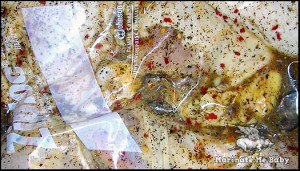It’s important to note – these marinating tips are what I like, what my family has grown to love over time. I would encourage you to play with the recipe’s and make them your own. What I give you is the basics – you get to add a touch of lime here, basil there and your own creativity.
Lets start if off with some basics:
1. Contact is the key – the more surface area that can absorb the marinade is essential:
- If you use a large chunk of meat it will only penetrate so far.
- By cutting the meat into individual service pieces you increase the overall surface that can intake some of that goodness.
- Cut it flat, place in a heavy zip top bag and squeeze all the air out and turn it often so the marinade gets an equal coat.
2. Don’t over do it – Remember not everything needs to be in the refrigerator overnight!:
- Poultry, seafood are not complex meat fibers and if you marinate them for the same time that you do a skirt steak, it will be mush or worse shoe leather.
- 30 minutes to 1 hour is usually enough time to marinate chicken.
3. Marinades the voodo they do!:
Depending on the type of meat you are using, it may need some help to bring it to an acceptable tenderness. Some plants and acids can break down the muscle and connective tissues in meats. You might be familiar with some cultures wrapping meats in papaya leaves, banana leaves etc. There is a school of thought that there is an enzyme in the plant leaves and when it comes into contact with meat it helps break it down. Down side, this can rob the meat of all the juice and can result in a drier meat.
Keep your meat cold – it serves no purpose to let meat sit in a marinade at room temperature – refrigeration is always needed to avoid the growth of harmful bacteria. Only let the meat come to room temperature before cooking.
4. Marinade for flavor:
Marinades use a base – and many use acids as a way to tenderize and provide flavor. Acids like citrus juices, pineapple, yogurt, buttermilk (think southern fried chicken) and wine provide that tenderizing by relaxing the muscle fiber. They also lend great flavor to the end product.
Use Extra-virgin olive oil – some say there are some health benefits. I say that by using this oil in the marinade you have a naturally non-stick piece of meat – and you can reduce the overall amount of oil on the grill and it brings some excellent flavor to the pool.
Dry marinades or rubs (recipes are in our seasoning sections) are generally used to enhance flavor – however some of the herbs and spices when mixed with an oil can add some additional tenderizing side effects. I find these work best when are used in grilling, pan-fry’s or broiling.
In our equipment section we encourage choosing mixing and cooking products that are free of aluminum. Why? Well, there are chemical reactions between many acid based marinades and the vessel you might choose to do the marinade. These reactions bring a nasty funk to the food and can discolor the food. Remember – Nature has her own way to help speed marination – combine the group below with some different herbs and you have a party on your hands:
- Pineapple
- Figs
- Papaya
- Ginger
- Wine
- Beer
- Citrus
- Vinegar
- Tomato
- Yogurt
- Buttermilk
5. Left over marinades:
Left over marinades can be used (unlike brines) however, you must first cook it. If you were not to cook it you run the risk to become very sick due to its time it was in contact with the raw food it was marinating. Once cooked, you can use the reduction for a nice basting liquid. sauce. Here are my rules:
Cook for at least 5 minutes after coming to the boiling point
We hope that these few – but simple tricks will help you get your grub on and get you marinating your meat!


